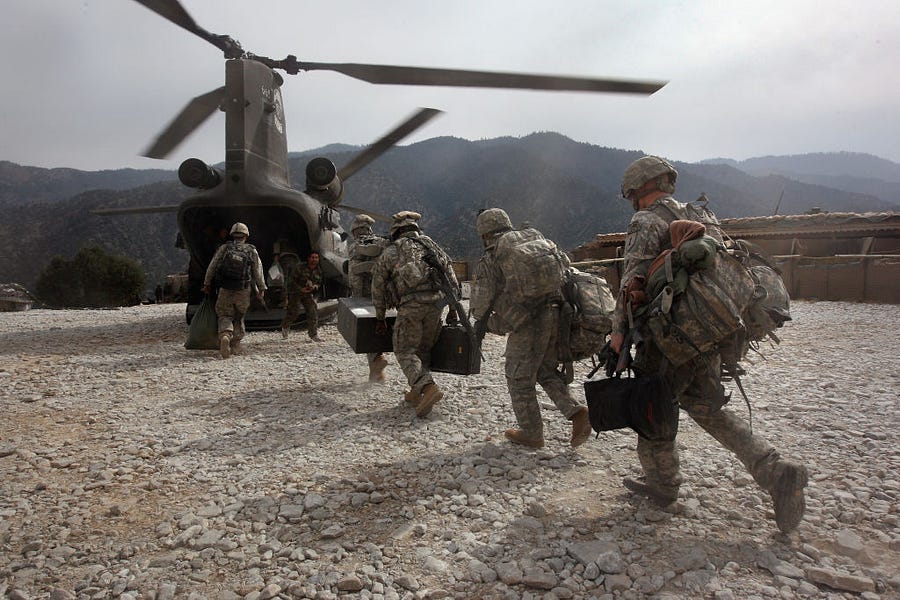Talking to reporters on July 2, President Biden was pressed about the sudden, embarrassing evacuation of our air base in Afghanistan and widespread predictions the Afghan government would fall quickly to the Taliban. The president testily replied: “I want to talk about happy things, man.”
His retort seems to have had the desired effect. Last week, at a CNN town hall, the president wasn’t asked about Afghanistan at all. The only mention came in a discussion about immigration. After explaining that migrants at the southern border seeking entry in the United States will be turned away, he added: “The one place you may have heard that I’m talking about more immigrants coming in are those folks from Afghanistan who helped the American soldiers, who will be … victimized very badly as a consequence of what happens if they’re left behind.”
This wasn’t the first concession to the reality of what we’re doing by withdrawing from Afghanistan. From the outset, the administration has admitted, mostly euphemistically, that an ugly civil war is almost assured and the toppling of the Kabul government is likely. The reason we’re letting these Afghan immigrants come to America is that everyone knows they’d be slaughtered if left behind because they helped Americans.
Because the withdrawal from Afghanistan has bipartisan support, and because the military never likes to admit a loss, few people are using the word “defeat”—and most of the critics who do hint at using the word lack credibility since they didn’t oppose Donald Trump’s desire to bug out even earlier.
Of course, there are people all too happy to use the “D” word—the Taliban and the terror groups it remains affiliated with. Osama bin Laden used the defeat of the Soviets to rally the faithful, and it seems foolish to think a new generation of bin Laden successors won’t do likewise.
In 2009, my friend Charles Krauthammer, who passed away three years ago, delivered an important speech at the Manhattan Institute. I’d say it was an influential speech, but alas, it wasn’t.
In his lecture, titled “Decline Is a Choice,” Krauthammer said: “The question of whether America is in decline cannot be answered yes or no. There is no yes or no. Both answers are wrong, because the assumption that somehow there exists some predetermined inevitable trajectory, the result of uncontrollable external forces, is wrong. Nothing is inevitable. Nothing is written. For America today, decline is not a condition. Decline is a choice. Two decades into the unipolar world that came about with the fall of the Soviet Union, America is in the position of deciding whether to abdicate or retain its dominance. Decline—or continued ascendancy—is in our hands.”
To the extent that Krauthammer was right—and I think he was—our abandonment of Afghanistan was indeed our choice. In the five years prior to Biden’s announcement, casualties in “America’s longest war” had been reduced to a relative handful, and combat deaths had ceased by the time Biden made his announcement. We simply lost the will to stick it out.
And for understandable reasons. We’ve been there a long time. The Afghan government is woefully corrupt. The threat from Islamist terrorism seems like it’s in remission—though how much of this is attributable to our efforts there and elsewhere is difficult to gauge. The U.S. conducted counterterrorism operations in 85 countries from 2018 to 2020, though Americans served in combat in “only” eight.
In that context, what we’ve been doing the last couple of years in Afghanistan hasn’t been a war, but a counterterrorism operation. The “longest war” narrative, unfortunately, was more powerful than the reality.
That’s part of what vexes me about our unconditional capitulation. I have profound moral disagreements with those who shrug at the potential humanitarian toll likely to result from our departure: the women and girls exiled from schools, the theocratic tyranny, the executions. But what rankles intellectually is the claim that this is serious, hard-headed realpolitik.
The Biden administration says it wants to pivot to “strategic competition” with rival powers such as China and Russia and recalibrate our relations with the Middle East. “Wars”—or even just counterterrorism operations such as the one we were conducting in Afghanistan—must therefore be in our “national interest.”
Well, giving up an air base, multiple listening posts and an allied government at the cross section of Central Asia and the Middle East while simultaneously handing our enemies a great political victory in exchange for a domestic political talking point doesn’t strike me as all that strategic. It strikes me as a choice—and a bad one.








Please note that we at The Dispatch hold ourselves, our work, and our commenters to a higher standard than other places on the internet. We welcome comments that foster genuine debate or discussion—including comments critical of us or our work—but responses that include ad hominem attacks on fellow Dispatch members or are intended to stoke fear and anger may be moderated.